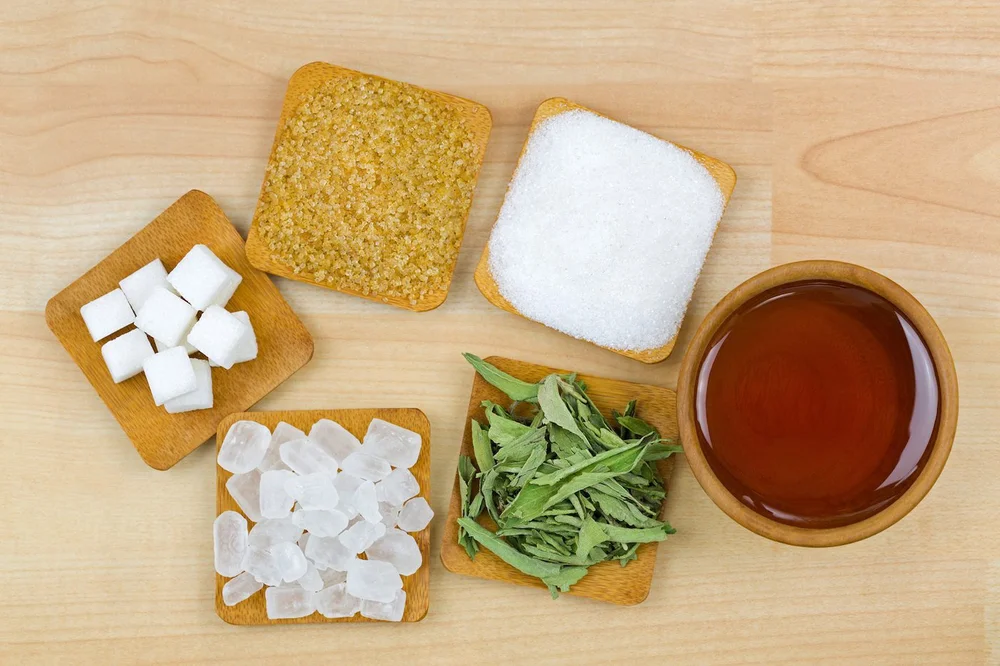Top 5 Healthiest Alternative Sweeteners to Sugar
Most Americans consume upwards of 80 grams of sugar each day. This is far above the USDA’s recommended 24 grams for women and 36 grams for men. That’s about 6 teaspoons for women and 9 teaspoons for men.
Excessive sugar intake has been associated with an increased risk for many illnesses. Consuming many of your calories via items with lots of sugar will likely leave you feeling less than your best.
Most of the added sugars Americans consume come from sugar-sweetened beverages, such as flavored coffees and soft drinks. While there are diet versions of soft drinks that are made with artificial sweeteners, limiting your intake of soft drinks is best as it will create more balance in your diet.
Are Some Sweeteners Healthier Than Others?
This is a popular question that has been hotly debated in the health and wellness space. With many popular diets requiring their adherents to reduce or eliminate sugar, it has become an important discussion.
However, it’s important to understand that sugar is sugar and the body processes carbohydrates that come from different forms of sugar the same way. It’s important to avoid the “health halo” effect, which can happen when we assume that because something can be found in nature, it must be superior to man-made items. However, the body processes honey the same way it does refined white sugar, for example.
Another important distinction to make is that sweeteners such as maple syrup, often thought of as healthier for being plant-based, are digested and absorbed the same way that refined sugars are. The only thing that makes natural sweeteners superior to conventional sugars is the number of nutrients they offer that refined sugars don’t.
Top 5 Healthy Alternative Sweeteners to Sugar

1. Honey
Honey is a natural sweetener that’s easily incorporated into many foods and beverages. It’s easy to substitute for white sugar in baked goods and makes them moist. It has many medicinal properties and has been used for thousands of years across many cultures for healing wounds and preventing infection. The antioxidant, anti-inflammatory, and antibacterial benefits of honey are what sets it apart from refined sugars, but it’s important to note that it isn’t “healthier” in the sense that it’s okay to consume in excess. You still want to practice moderation.
There are many different types of honey, but generally speaking, raw honey has been minimally processed and contains a lot more of the beneficial ingredients that make honey healthy. Honey that works for both your budget and health goals is best.
 2. Stevia
2. Stevia
Stevia is a no-calorie sweetener made from the stevia leaf. It’s a favorite among registered dietitians because a little bit goes a long way (it’s 50-350x sweeter than sugar), and some research shows that it may be effective in helping people lose weight more effectively.
While earlier studies suggested that stevia had pro-inflammatory effects, recent research has demonstrated that it’s safe and is a great substitute for sugar. It doesn’t increase your blood sugar levels but instead passes through the body.
For this reason, consuming too much may cause some people to have upset stomachs or diarrhea. Other potential side effects may include bloating or nausea. Some people also report an unpleasant aftertaste with stevia, so the best thing you can do is try it out and see if you like it.
Take special care to read the instructions on the package or container you buy. It should state how much stevia is needed to be equivalent to a teaspoon or other measurement of sugar. Stevia is very potent, and you only need a small amount.
3. Erythritol
Erythritol is unlike stevia or honey in that it’s a sugar alcohol. Sugar alcohols are organic compounds derived from sugar that has been either manually altered to resemble both sugar and alcohol molecules or are naturally occurring.
Erythritol is a type of sugar alcohol that occurs naturally. It’s created by fermenting the sugars found in cornstarch.
They don’t behave like alcohol, which is ethanol. They are a type of carbohydrate that has a lesser effect on blood sugar compared to typical carbs due to the previously described altered structure.
Erythritol is popular among those following the ketogenic diet because many people like the flavor and the fact that it doesn’t affect blood sugar. This is what makes it more attractive than regular sugar.
Another thing to note with sugar alcohols is that when consumed in excess, they may cause diarrhea in some people. Everyone’s tolerance levels are different, so if you’re switching to erythritol for the first time, start with small amounts and work your way up.
4. Monk Fruit Extract
Luo Han Guo, or Monk Fruit, is a fruit native to southern China and the northern region of Thailand. It’s made by collecting the juice of the flesh and drying it into a powder.
One study found that monk fruit was effective as a low glycemic index food additive and stimulated insulin production. Both of these factors greatly affect your blood sugar levels, and having high levels of sugar in the blood can damage body tissues over time.
That’s why this sweetener is said to be a good alternative to regular sugar, especially for those who need to take special care to ensure their blood sugar levels stay stable. Maintaining blood sugar levels is key to optimal health as it maintains consistent energy levels, focus, and better sleep.
5. Coconut Sugar
Coconut sugar comes from the coconut palm tree and is said to be more nutritious. It’s made by dehydrating the sap of the coconut palm tree, and the result is a light brown sugar that looks similar in appearance to raw sugar.
A 2017 study found that, unlike regular sugar, coconut sugar is potentially high in antioxidants such as vitamin C, and also contains several B vitamins, potassium, and sodium. As previously discussed, refined sugars are completely devoid of nutrients.
This shows that although coconut sugar will have the same effect on blood sugar levels and should be consumed in moderation, it’s “healthier” in the sense that it has nutritional benefits that regular sugar cannot offer.
So Long, Sugar
Consuming excess sugar in any capacity can be detrimental to your health. Many illnesses have been linked to excessive sugar intake over extended periods of time.
Finding alternatives to conventional sugar can be a good way to reduce your added sugar intake and prevent illness. However, the sugar that you opt for should still be consumed in moderation, as alternative sweeteners aren’t without their side effects.
It’s a good idea to check with your doctor or a registered dietitian before switching to an alternative sweetener if you have any concerning health conditions.
At BrainMD, we’re dedicated to providing the highest purity nutrients to improve your physical health and overall well-being. For more information about our full list of brain healthy supplements, please visit us at BrainMD.
- Good vs. Bad Carbs: How to Create a Balanced Diet with Healthy Carbs! - January 27, 2022
- How to Make Homemade Salad Dressings + Recipes! - August 28, 2021
- How to Ditch Diet Culture & Improve Your Relationship with Food - August 25, 2021

 2. Stevia
2. Stevia


I found your information about sweeteners very informative, easy to understand, and motivating.